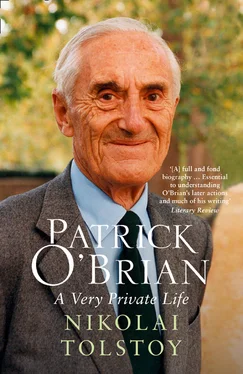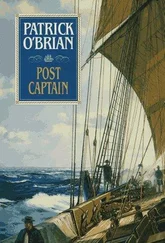A great difficulty would be the presentation: it could hardly be done from outside (the all-knowing observer) and I hardly know whether I could manage it from inside each character.
Patrick does not appear to have been at all troubled by the possibility that informed readers might identify the protagonists. (His friend Walter Greenway was similarly concerned lest people in Cwm Croesor discover the extent of their potentially embarrassing portrayal in Three Bear Witness .) Nor, more surprisingly, does this thought seem to have worried my mother. It seems they generally espoused the view that Patrick’s literary work stood apart from the material world: connections between them hardly mattered. Equally, they may not unreasonably have assumed that no one in Collioure was likely to read the book.
In October my parents assisted in bringing in the grape harvest. ‘Vendanged for Vincent Atxer’, noted my mother. ‘Too long, did not like the V[incent].A[txer].s. O[dette]. was there, objectionable. Told us the équipe [working party] in the plains was very grossier [coarse]. Youths rolled women in the dust, took girl’s trousers off.’[fn14] Next day there was a further vendange, at which my mother was evidently annoyed by ‘O[dette]. horseplay moustissing the men.’[fn15] On the third day my mother and Patrick ‘Worked from 8.30 a.m. to 4.30 p.m. Beastly children. Very, very fatigued.’ My mother was far from being a prude, and it is possible that she objected to Patrick’s observing their beautiful friend behaving in so wantonly provocative a manner. The sultry Odette was a lissom creature of the South, who amid the grape harvest under the burning sun appeared almost an elemental being.[fn16]
Four days later, Patrick ‘sketched out vendange tale’. It seems likely that this was the basis of chapter VIII of The Catalans , with its vivid depiction of the exhausting physical labour and pain incurred in gathering the grapes, together with the erotically charged relationship between the intellectual outsider, Alain Roig, and the lovely Catalan girl Madeleine, who has been deserted by her painter husband Francisco. The episode builds up to a heated climax, with Alain’s symbolic rape of Madeleine:
With a quick pace he was up to her. He knocked her to the ground. She fell on her knees, and crouching over her he gripped her hair and ears, pressed his teeth hard against her forehead, and in the surrounding cries and laughter he crowed three times, loud like a cock.
Patrick appears at first to have remained undecided precisely what use he might make of these possibilities, until on 18 December he took my mother for a walk up to the Madeloc tower. It was a beautiful day: passing the old barracks (which at one point they envisaged as a permanent refuge from the town), with partridges flying around, they collected wild daffodil bulbs to plant in their window box. Buddug cavorted, madly hunting and catching nothing. As they walked, Patrick for the first time unfolded his idea for a novel on the theme of life among the local Catalans.
Patrick, toying with various approaches to his novel, was struck down yet again by one of his nervous attacks and retired to bed, where he received the usual medication. So bad was the bout on this occasion, that he had to force himself not to think of the book lest the pangs recur. Not until 9 January 1952 did he recover sufficiently to begin working on it. At the end of the month my mother called on Odette to collect information about the social structure of the town, a factor which was to be vividly delineated in the novel. On 6 February ‘P. showed me first chapter of novel: terribly impressed & happy.’ With my mother’s enthusiasm buoying him up, Patrick now found the book advancing with increasing satisfaction. Despite intermittent setbacks and misgivings, he worked throughout the summer, until he finally laid down his pen on 12 September. ‘Much fatigued & terribly pale, kept lying on bed feeling faint,’ as my concerned mother noted.
However, the task was completed, and both were enthusiastic over the result. In May Patrick had toyed with the title Interested Motives , but eventually settled on The Catalans . My mother threw herself into typing the text, and on 2 October copies were sent to Harcourt Brace in New York, and Rupert Hart-Davis in London.
No sooner were the parcels despatched, than an anticlimactic reaction set in. On 5 November ‘Nervous tension over Catalans suddenly overwhelming. It matters so hideously.’ Might it suffer the same distressing fate as the collection of short stories, on which such high hopes had been pinned?
Three weeks passed by, during which they attempted to distract themselves with household improvements. ‘Wait, wait, wait, for post.’ Finally, on 26 November 1952, came news as good as might be hoped for. A telegram arrived from Naomi Burton at Curtis Brown in New York, announcing that Harcourt Brace had offered to take The Catalans at the same rate as Testimonies . Since the book was complete, they would shortly receive a second time within the year the princely sum of $750, tax-free!
Exultation reigned in the little apartement . ‘Very, very happy,’ rejoiced my mother. Patrick promptly wrote to Andorra concerning the building plot for which they had been negotiating. Then they jumped up, and ‘walked to P[ort]. Vendres without noticing the way’. My mother was ‘unable to resist giving P. gloves, camera (whose shutter won’t work & Patau [the photographer] is shut) & pineapple in tin. All these were for his birthday’ on 12 December. Three days later the contract arrived.
The book represents in many ways a tribute to the rugged land he had come to love, and its lively inhabitants. Among them they now had many fast friends, and were accepted as honorary Colliourenchs . It is the more fortunate, consequently, that the novel was not translated at the time into French or Catalan, since it included matter that must surely have provoked offence and dismay in some quarters.
The greatest pleasure I derive from Patrick’s novel lies in the exquisite evocation of Collioure (barely disguised as ‘Saint-Felíu’), and its stark hinterland of vineyards and mountains. Here is enshrined forever the old Collioure, before the destruction of ancient customs, language, clothing, music; the end of the fishing industry, and the building of rank upon rank of lotissements on the skirts of the town. Fortunately, enough of the old town survives in physical form for it to be possible to people it again in imagination, viewed in the light of Patrick’s loving recreation in The Catalans .
Several of his extended pen portraits are taken from the life. The account of the vendange in chapter VIII, with its vivid depiction of the toil involved, culminating in Alain’s climactic ‘rape’ of the lubricious Madeleine, drew extensively on Patrick’s own experience during those three backbreaking days in October 1951, when Odette’s provocative behaviour privately scandalized my mother.[fn17] Again, the festival in the central place of the town, recounted in chapter IX, echoes the Carnival witnessed by Patrick in February 1952.
For the biographer the book contains much of interest. The figure of Dr Alain Roig, returning from long exile in the Far East to resolve a domestic crisis at home, stands (like Pugh in Three Bear Witness ) in material respects for Patrick himself. A detached, reflective outsider, he is concerned to observe and dissect the psychological turmoil by which he finds himself surrounded. At one point he ascends the town rampart, where he contemplates from on high the tumbled confusion of houses below:
He passed it carefully over in review, looking for changes and for known, personal landmarks. It was exactly as he remembered it, as he thought of it when he was away, exactly the same and yet with an additional strength of life, a vibrant immediacy: his memory, however sentimental with the distance, might not have provided the shrilling of the cicadas in the oleaster that grew tortuously from a crevice in the wall below, the play of the dancing, shimmering air, the flick and dart of the lizards, and the distant sound of men hauling on a boat.
Читать дальше












